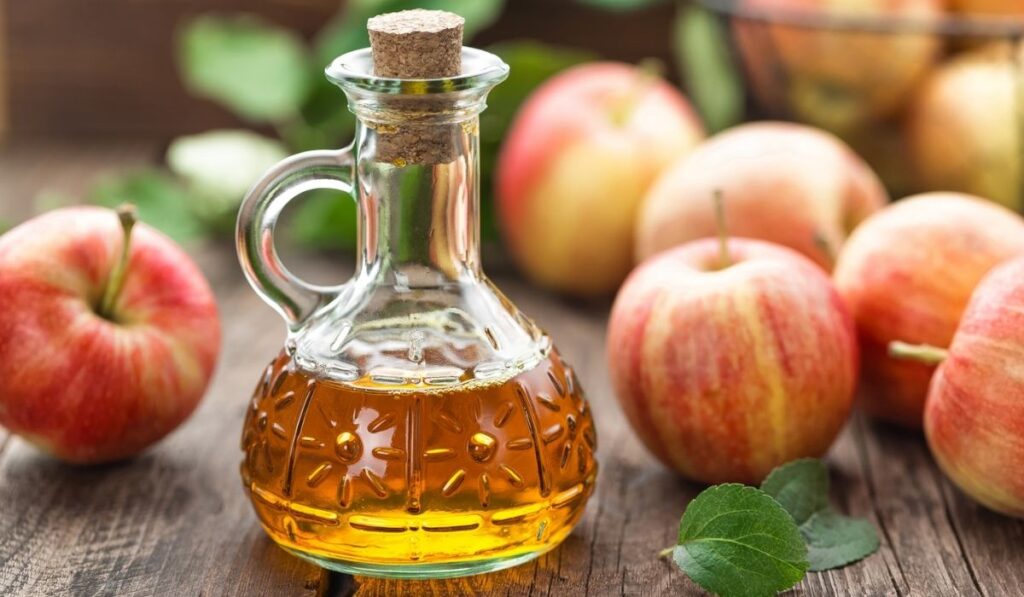While apple cider vinegar may have its health benefits, it definitely harms your teeth. The acidic content in apple cider vinegar erodes the enamel on your teeth, potentially leading to tooth decay. To avoid damage to your teeth, you’ll want to dilute it and take a few other precautions – but you can still have vinegar safely.
The acidity of apple cider vinegar erodes tooth enamel, exposing teeth to harmful bacteria, acid attacks, and decay. To help prevent damage, dilute apple cider vinegar with water in a ratio of 5 to 1, drink it through a straw, and rinse with water afterward. You can also try vinegar in pill form.
Apple cider vinegar is also commonly used to whiten teeth, but studies have shown that it does more harm than good there as well. There are better options available out there, such as take-home whitening kits. Brushing your teeth 30 mins after consuming apple cider vinegar is an effective way to curb its harmful effects.
How Apple Cider Vinegar Affects Your Teeth

While you may have heard of the benefits and uses of common apple cider vinegar (example on Amazon), it’s important to remember that along with its benefits, the acidic nature of apple cider vinegar can cause harm your teeth. According to studies, if you’re drinking apple cider vinegar, it’s probably doing your teeth more harm than good.
Many of the harmful effects of apple cider vinegar are due to its highly acidic nature, which puts it in the same pool as some soft drinks. This means the acids in the apple cider vinegar can damage the enamel on your teeth and cause it to erode.
The enamel is the protective layer on your teeth, which is also a shield from all the harmful bacteria and acids. When the acids from apple cider vinegar attack the enamel on your teeth, it causes it to erode, leaving your tooth vulnerable to nasty decay.
Further studies have shown that an unmoderated and increased intake of apple cider vinegar will speed up the erosion of tooth enamel.
These harmful effects can, however, be controlled. Start by consuming a moderate amount of apple cider vinegar and dilute it with water when you do consume it.
You should also brush your teeth after drinking apple cider vinegar; however, it’s always recommended to wait about 30 minutes before doing so, because the acid in the vinegar softens your enamel. Immediate brushing can cause further damage.
Can You Whiten Your Teeth With Apple Cider Vinegar?
It is possible to whiten your teeth using apple cider vinegar. Many sources recommend using apple cider vinegar, either fully concentrated or diluted with water, or some other products like baking soda.
While apple cider vinegar may indeed help to whiten your teeth, most of the sources tend to forget to mention the harmful effects of apple cider vinegar on your teeth.
A study conducted to investigate the effects of apple cider vinegar found it to have a bleaching effect on teeth. Along with that, apple cider vinegar was also found to damage the surface of your teeth.
So, once again, using apple cider vinegar to whiten your teeth will end up doing more harm than good. The acidic nature of the vinegar will erode your tooth’s enamel, making it more vulnerable to attacking bacteria, acids, cavities, and gum sensitivity.
If you’re looking to whiten your teeth, there are safer and healthier options available, such as professional teeth whitening. However, teeth whitening can be expensive. Take-home teeth whitening kits are another safe and effective way of whitening your teeth, without having any kinds of vinegar involved.
Always consult with your dentist before pursuing any teeth-whitening method. Some methods can be harmful to your teeth.
How to Minimize the Negative Effects of Apple Cider Vinegar

While apple cider vinegar may have its fair share of negative effects on your oral health, there are ways of minimizing them. Here are some techinques you can try:
- Dilute it: Diluting apple cider vinegar with water brings down its acidity and makes it less harmful for your teeth. When diluting, keep a ratio of 5 parts water to 1 part vinegar. Refrain from consuming apple cider vinegar in its most concentrated form.
- Drink it through a straw: If you’re going to drink apple cider vinegar, it’s better to use a straw. The straw helps prevent the vinegar from coming into direct contact with your teeth.
- Use it in pill form: Apple cider vinegar also comes in a pill form that contains a dehydrated version of the substance. Taking pills means no contact with your teeth. Try these capsules from Horbäach (on Amazon).
- Rinse your mouth with water: Use plain water to rinse your mouth after consuming apple cider vinegar. The water helps clear your mouth of any remaining acid that might remain in your mouth and potentially cause harm.
- Don’t brush immediately: Since the acids in the apple cider vinegar soften the enamel on your teeth, it’s best to wait around 30 minutes before you proceed to brush your teeth.


